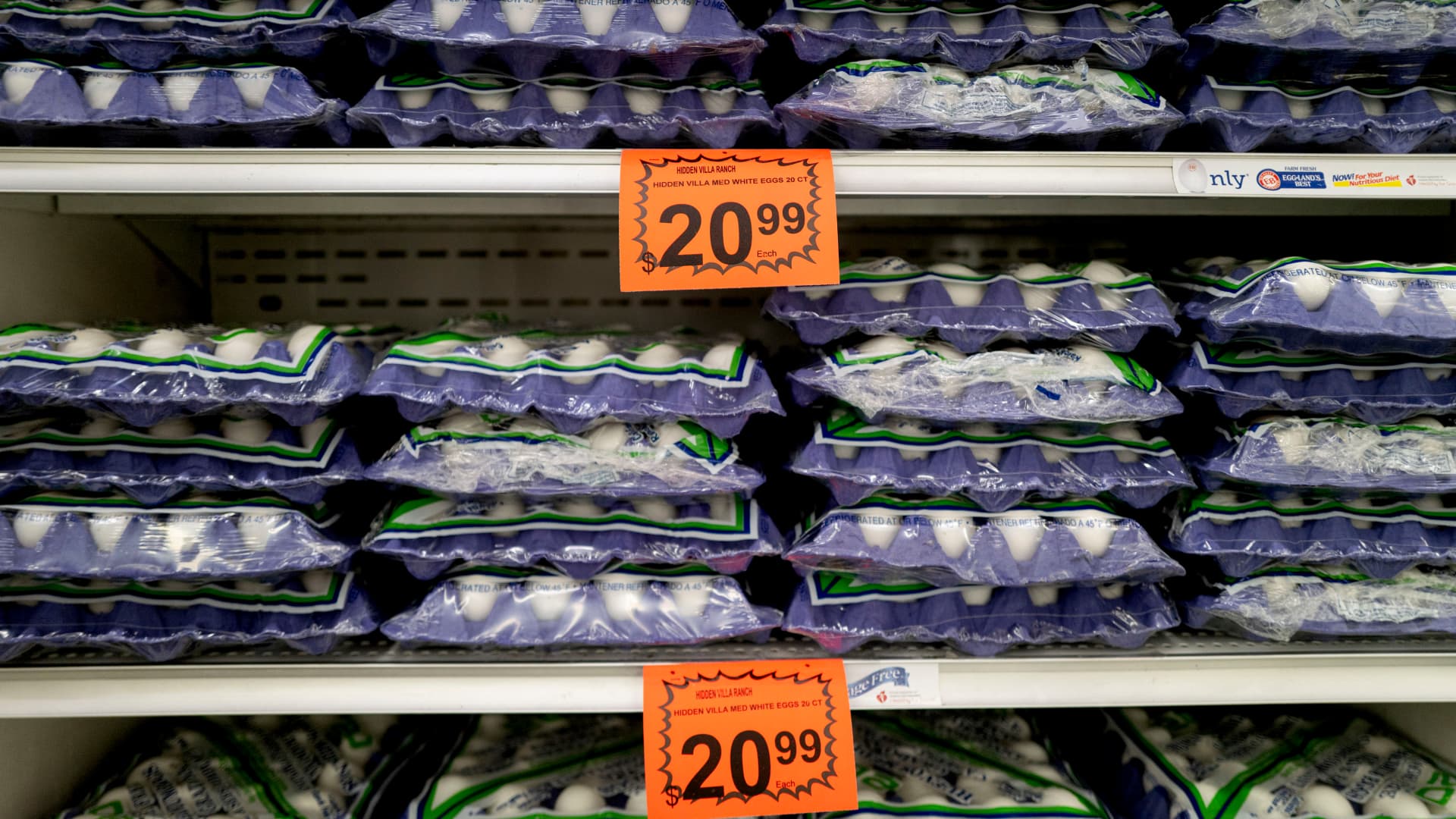Eggs for sale at a grocery store in Los Angeles on Feb. 26, 2025.
Eric Thayer/Bloomberg via Getty Images
Inflation receded in February on the back of easing price pressures for consumer staples like gasoline, groceries and housing, amid worries that President Donald Trump’s tariff policies could stall progress.
The consumer price index rose 2.8% for the 12 months ended in February, the U.S. Bureau of Labor Statistics reported Wednesday. That’s down from 3% last month.
The deceleration is encouraging after fears in recent months that inflation had become entrenched and wasn’t falling back to target.
“Progress is bumpy,” said Michael Pugliese, senior economist at Wells Fargo Economics. “It’s not a linear path down. There are still risks, but there are no signs of a reacceleration with the data in hand.”
The consumer price index measures how quickly prices rise or fall for a basket of goods and services, from haircuts to coffee, clothing and concert tickets.
CPI inflation has declined significantly from its pandemic-era high of 9.1% in June 2022. However, it remains above the Federal Reserve’s target. The central bank aims for a 2% annual rate over the long term.
“Excluding any major policy changes, I’d expect [inflation] to continue gradually slowing,” Pugliese said. “Of course, the big question on everyone’s mind is, what are the big policy changes that will happen over the course of this year?”
Trump imposed a fresh round of tariffs on foreign steel and aluminum imports on Wednesday, triggering retaliatory tariffs from Europe on about $28 billion of U.S. goods starting in April. The Trump tariffs follow on others he’s already imposed on Canada, China and Mexico, the three largest trading partners of the U.S.
More from Personal Finance:
‘Wealthy tax dodgers’ could benefit from IRS layoffs, Democrats warn
Consumer outlook sinks as recession fears take hold
Trump says Education Dept. shouldn’t handle student loans
Tariffs, a tax paid by U.S. importers, add costs for businesses that ultimately get passed to consumers, economists said. Steel tariffs, for example, could make steel-intensive items like cars, homes and machinery more expensive, they said.
The president has proposed additional tariffs, though it’s unclear if they’ll take effect or for how long.
Egg prices are up 59%
Egg prices spiked by 59% over the past year, by far the largest increase for any item in February.
An outbreak of avian flu — which is highly contagious and lethal among birds — has killed millions of egg-laying chickens and reduced egg supply, economists said. The U.S. Justice Department also opened an investigation into potential antitrust issues related to the surging price of eggs, according to news reports.
The price of instant coffee has also increased about 9% in the past year, according to CPI data. Weather patterns like droughts fueled by climate change have disrupted major coffee growers including Brazil, reducing supplies of coffee beans.
Overall, though, inflation for groceries is relatively low, at 1.9% in the past 12 months.
Gasoline inflation was also tame in February. Prices were down 1% from January to February, and down 3% in the past year, according to CPI data.
Shelter is the largest component of the CPI, and movements up and down can have a significant impact on overall inflation readings. Annual inflation for shelter was at 4.2% in February, the lowest since December 2021.
“Housing inflation is historically the ‘stickiest’ component of inflation, meaning it takes longer to buck price trends,” Gargi Chaudhuri, BlackRock’s chief investment and portfolio strategist for the Americas, wrote in an e-mailed note Wednesday. “The recent trend in housing prices keeps us optimistic on the future trajectory of inflation.”

 Blog Post1 week ago
Blog Post1 week ago
 Economics1 week ago
Economics1 week ago
 Finance1 week ago
Finance1 week ago
 Economics1 week ago
Economics1 week ago
 Economics1 week ago
Economics1 week ago
 Personal Finance1 week ago
Personal Finance1 week ago
 Accounting1 week ago
Accounting1 week ago
 Economics1 week ago
Economics1 week ago










